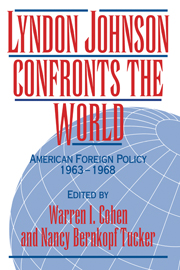Book contents
- Frontmatter
- Contents
- Dedication
- Acknowledgments
- List of Contributors
- Introduction
- 1 Lyndon B. Johnson: Change and Continuity
- 2 Johnson, Vietnam, and Tocqueville
- 3 “A Time in the Tide of Men's Affairs”: Lyndon Johnson and Vietnam
- 4 Threats, Opportunities, and Frustrations in East Asia
- 5 Toward Disillusionment and Disengagement in South Asia
- 6 Lyndon B. Johnson, Germany, and “the End of the Cold War”
- 7 The Promise of Progress: U.S. Relations with Latin America During the Administration of Lyndon B. Johnson
- 8 Keeping Africa off the Agenda
- 9 Balancing American Interests in the Middle East: Lyndon Baines Johnson vs. Gamal Abdul Nasser
- 10 Lyndon Johnson: A Final Reckoning
- Suggestions for Further Reading
- Index
4 - Threats, Opportunities, and Frustrations in East Asia
Published online by Cambridge University Press: 05 June 2012
- Frontmatter
- Contents
- Dedication
- Acknowledgments
- List of Contributors
- Introduction
- 1 Lyndon B. Johnson: Change and Continuity
- 2 Johnson, Vietnam, and Tocqueville
- 3 “A Time in the Tide of Men's Affairs”: Lyndon Johnson and Vietnam
- 4 Threats, Opportunities, and Frustrations in East Asia
- 5 Toward Disillusionment and Disengagement in South Asia
- 6 Lyndon B. Johnson, Germany, and “the End of the Cold War”
- 7 The Promise of Progress: U.S. Relations with Latin America During the Administration of Lyndon B. Johnson
- 8 Keeping Africa off the Agenda
- 9 Balancing American Interests in the Middle East: Lyndon Baines Johnson vs. Gamal Abdul Nasser
- 10 Lyndon Johnson: A Final Reckoning
- Suggestions for Further Reading
- Index
Summary
Although we are making real progress in developing a distinctive approach of this Administration to Africa, Latin America, and Europe, it is clear that a good part of your Administration's place in history will consist in the reshaping of Asia and our relations in it.
Walt Rostow's optimistic assessment of the impact that Lyndon Johnson's presidency would have upon Asia carries in retrospect more than its share of bitter irony. For the policies that the National Security Adviser celebrated actually entailed decisions that devastated the administration, winning Johnson no credit in the region. At the heart of Johnson's vision of Asia stood Vietnam. Beyond that commitment, to which LBJ sought to bind the United States' Asian allies and by which he judged the United States' Asian enemies, his ideas lacked energy and imagination. No new era dawned. Johnson made little progress toward normalization with China; inaugurated few departures in relations with Japan, South Korea, or Taiwan; and reached possibly the nadir, following the Korean War, in interaction with North Korea. Rostow, of course, proved correct in his estimate that Lyndon Johnson would be remembered for his involvement in Asia, but the weight of the Vietnam disaster precluded initiatives or accomplishments that would have made his place in history a positive rather than a negative chapter.
LBJ's preoccupation with Vietnam provided the framework for the president's approach toward and assessments of the nations of Asia.
- Type
- Chapter
- Information
- Lyndon Johnson Confronts the WorldAmerican Foreign Policy 1963–1968, pp. 99 - 134Publisher: Cambridge University PressPrint publication year: 1995
- 1
- Cited by



